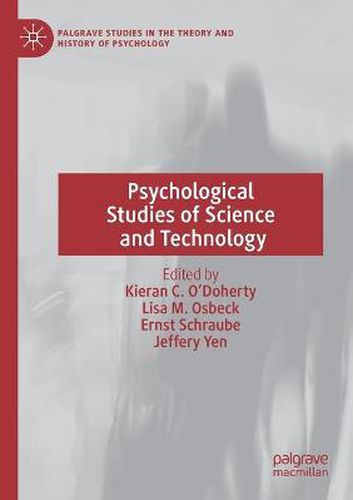Readings Newsletter
Become a Readings Member to make your shopping experience even easier.
Sign in or sign up for free!
You’re not far away from qualifying for FREE standard shipping within Australia
You’ve qualified for FREE standard shipping within Australia
The cart is loading…






This title is printed to order. This book may have been self-published. If so, we cannot guarantee the quality of the content. In the main most books will have gone through the editing process however some may not. We therefore suggest that you be aware of this before ordering this book. If in doubt check either the author or publisher’s details as we are unable to accept any returns unless they are faulty. Please contact us if you have any questions.
This book provides a significant contribution to scholarship on the psychology of science and the psychology of technology by showcasing a range of theory and research distinguished as psychological studies of science and technology. Science and technology are central to almost all domains of human activity, for which reason they are the focus of subdisciplines such as philosophy of science, philosophy of technology, sociology of knowledge, and history of science and technology. To date, psychology has been marginal in this space and limited to relatively narrow epistemological orientations. By explicitly embracing pluralism and an international approach, this book offers new perspectives and directions for psychological contributions.
The book brings together leading theorists and researchers from around the world and spans scholarship across a variety of traditions that include theoretical psychology, critical psychology, feminist psychology and social constructionist approaches. Following a historical and conceptual introduction, the collection is divided into three sections: Scoping a New Psychology of Science and Technology, Applying Psychological Concepts to the Study of Science and Technology and Critical Perspectives on Psychology as a Science. The book will interest interdisciplinary scholars who work in the space of Science and Technology Studies and psychologists interested in the diverse human aspects of science and technology.
$9.00 standard shipping within Australia
FREE standard shipping within Australia for orders over $100.00
Express & International shipping calculated at checkout
This title is printed to order. This book may have been self-published. If so, we cannot guarantee the quality of the content. In the main most books will have gone through the editing process however some may not. We therefore suggest that you be aware of this before ordering this book. If in doubt check either the author or publisher’s details as we are unable to accept any returns unless they are faulty. Please contact us if you have any questions.
This book provides a significant contribution to scholarship on the psychology of science and the psychology of technology by showcasing a range of theory and research distinguished as psychological studies of science and technology. Science and technology are central to almost all domains of human activity, for which reason they are the focus of subdisciplines such as philosophy of science, philosophy of technology, sociology of knowledge, and history of science and technology. To date, psychology has been marginal in this space and limited to relatively narrow epistemological orientations. By explicitly embracing pluralism and an international approach, this book offers new perspectives and directions for psychological contributions.
The book brings together leading theorists and researchers from around the world and spans scholarship across a variety of traditions that include theoretical psychology, critical psychology, feminist psychology and social constructionist approaches. Following a historical and conceptual introduction, the collection is divided into three sections: Scoping a New Psychology of Science and Technology, Applying Psychological Concepts to the Study of Science and Technology and Critical Perspectives on Psychology as a Science. The book will interest interdisciplinary scholars who work in the space of Science and Technology Studies and psychologists interested in the diverse human aspects of science and technology.